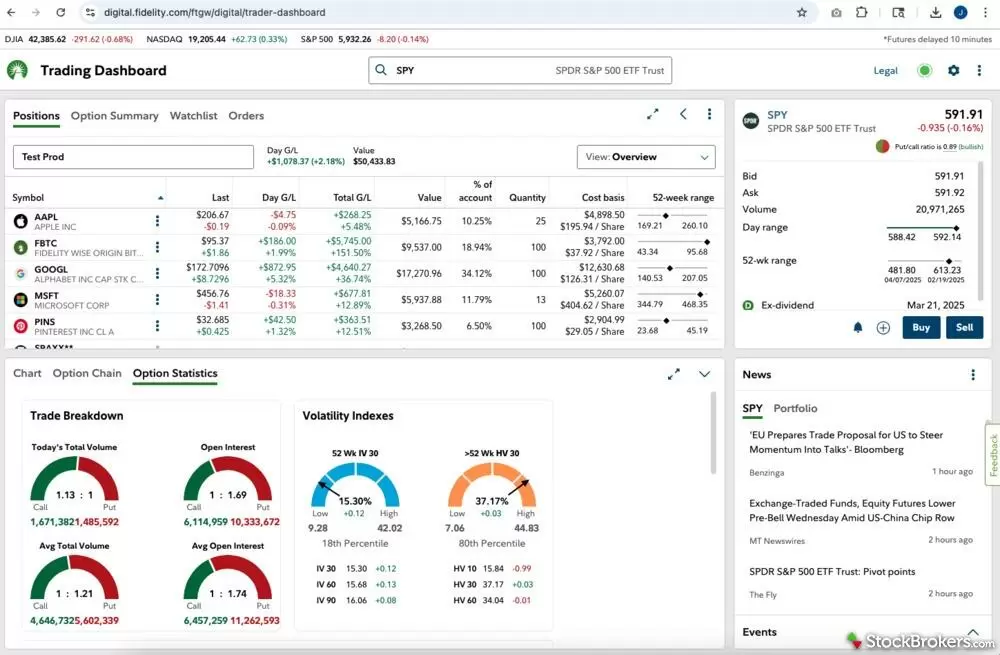Winners Summary
Best broker for IRAs - Fidelity
| Company |
Overall |
IRA Annual Fee |
Traditional IRAs |
Roth IRAs |
 Fidelity Fidelity
|
 |
$0.00 |
Yes |
Yes |
Fidelity is the gold standard for IRAs (followed closely by Charles Schwab), providing easy access to and expert guidance on every retirement account type under the sun — traditional, Roth, SEP, SIMPLE, spousal, custodial, inherited and rollovers.
Prices: Fidelity’s prices can’t be beat. The head-turner offering for fee-conscious savers is the broker’s $0-management-fee Fidelity ZERO index mutual funds. Not even Vanguard, the low-cost index fund pioneer, can compete with that. The catch? Fidelity ZERO funds can only be purchased and held at Fidelity. Translation: You’ll need to liquidate your position if you decide to move your money to another broker.
Automated investing: Investors with $25,000 or less in an IRA qualify for free automated portfolio management via Fidelity Go, which uses ZERO funds for further savings. (A 0.35% fee kicks in once your balance exceeds that, in which case you might consider Interactive Brokers’ rock-bottom 0.2% managed investment service.) If you’ve got money in an old 401(k) plan, Fidelity’s rollover IRA game is top-notch. Rollover specialists will even hop on a call with your old plan administrator to ensure everything is in place for a smooth transfer.
Check out my Fidelity IRA review to learn more about why its my top choice for investors looking for an IRA.
Best for active IRA trading - Charles Schwab
| Company |
Overall |
IRA Annual Fee |
Traditional IRAs |
Roth IRAs |
 Charles Schwab Charles Schwab
|
 |
$0.00 |
Yes |
Yes |
Schwab’s purchase and integration of TD Ameritrade upped the broker’s already strong investing game for hands-on IRA investors and data hounds. Now DIY investors have access to TDA’s highly-rated thinkorswim platform (web and desktop), reams of research, and tools to help you screen stocks, ETFs, mutual funds and dive deep enough to do a master’s thesis on fixed-income investments.
Fractional shares: Schwab’s fractional shares (“Stock Slices”) make it easy for retirement savers to invest small-dollar amounts to build an IRA portfolio for as little as $5 at a time with no trading commission. (Choose from any company within the S&P 500.) Heads up, fund investors: Be aware that some non-Schwab mutual funds (ones from Fidelity and Vanguard, for example) come with a hefty $74.95 transaction fee.
If you’re an active trader, read our overall Charles Schwab review that gives a full breakdown of this award-winning brokerage firm. If you want to learn more about why Schwab is a great choice specifically for investors looking for an IRA, check out my Charles Schwab IRA review.
Best for IRA withdrawal options - E*TRADE from Morgan Stanley
| Company |
Overall |
IRA Annual Fee |
Traditional IRAs |
Roth IRAs |
 E*TRADE E*TRADE
|
 |
$0.00 |
Yes |
Yes |
Aside from being one of StockBrokers.com’s favorite brokers overall, E*TRADE came up with a really smart retirement product. Its Complete IRA adds cash management convenience to IRA accounts. Clients over the age of 59½ can access their IRA cash easily with checks and debit cards, making E*TRADE a no-brainer once you hit the best part in retirement planning: when you actually retire.
Easy withdrawals: At some point, your investing goals will turn from amassing a retirement fortune to spending it. Here’s where E*TRADE’s Complete IRA makes it easy to live large on your savings. This unique no-fee retirement account is designed to streamline IRA withdrawals (aka “IRA distributions”). It comes with a debit card and checks and supports electronic bill payments, providing instant access to your savings without having to wait days for settlement. Another plus: There are no minimum withdrawal requirements.
Taxes: The E*TRADE Complete IRA is only available to those age 59½ or older, which is when the IRS allows penalty-free IRA withdrawals. Keep in mind that you may owe federal and state income taxes on withdrawals, depending on the type of IRA you’re using (e.g., Roth or traditional). E*TRADE doesn’t withhold taxes from the payments you receive, but it does lessen the headache of accounting for withdrawals by automatically generating IRS Form 1099-R for customers to use when filing tax returns.
Check out my E*TRADE IRA review to learn more.
Best IRA for portfolio management - Interactive Brokers
Interactive Brokers is an exceptional choice for IRA investors focused on portfolio management, especially those seeking customization. IBKR’s robust PortfolioAnalyst tool allows you to take a deep dive into your holdings, evaluate diversification, and track performance across all linked accounts. This feature is particularly valuable for IRA investors aiming to maintain a precise balance across various asset classes without additional fees. The PortfolioAnalyst tool can even benchmark your returns against key indices, giving you insights to fine-tune your retirement strategy over time.
Robo-advisors: One of Interactive Brokers’ unique offerings for IRA accounts is its range of customizable robo-advisor portfolios through Interactive Advisors. These portfolios allow investors to adjust asset allocation weights, add specialized ETFs for sector exposure, or prioritize ESG-focused investments to align with personal values. With a low $100 minimum and a competitive 0.20% management fee, IBKR’s robo-advisor service is highly accessible while still offering sophisticated customization. This blend of flexibility and low-cost access to managed portfolios makes it a top choice for those who want hands-on control with minimal costs.
Day trading: Interactive Brokers also caters to day traders with its low trading fees and support for fractional shares, which is rare among IRA providers. Offering all U.S. stocks and ETFs in fractional amounts, IBKR makes it possible to diversify even small IRA contributions effectively. While the platform is designed with active traders in mind, its powerful tools and low costs can benefit both hands-on and set-it-and-forget investors alike. However, newer investors may find IBKR’s interface somewhat complex, but for those willing to learn, it offers unmatched flexibility and resources.
Read my Interactive Brokers IRA review to learn more.
IRA account fees comparison
FAQs
How do you choose an IRA provider?
Before opening your new retirement account, consider these six tips for success:
- Choose a broker with no IRA fees. The more you pay in fees, the less money you have to invest for your future. Watch out for maintenance fees, fees for opening the IRA, fees for closing it, fees for transferring your money elsewhere, and the like.
- Decide which type of IRA to open. Should you go with a traditional IRA or a Roth? The main difference is when you get your tax break. A traditional IRA provides an upfront tax break: Contributions are tax-free (meaning you may be able to deduct them from your taxes today). Taxes come due when you withdraw money from the traditional IRA in retirement. With a Roth IRA, contributions are taxed upfront and withdrawals down the road are completely tax-free. (Check out the more detailed Roth and traditional IRA explanation below.)
- Make sure the account can age with you. You’re going to have an IRA for years — maybe decades — up to and throughout retirement. Take the time to make sure the platform is easy for you to navigate, the service has retirement investing tools you’ll use, and that you’re satisfied with the customer service. Don’t worry if you discover your first IRA choice is not the right fit: It’s easy to move your IRA to a new broker. (Check out our full online broker reviews for more information about the providers we recommend.)
- Maximize investment returns by making early contributions. The younger you are when you open and begin contributing to your IRA, the longer your portfolio will grow without being taxed. Even a few extra months of having your money in the market can make a significant difference in your long-term investment returns. Each year try to make your IRA contribution as early as possible. And remember, the IRS gives you until the tax filing due date (usually April 15th) to make your contribution for the prior tax year!
- Expand your options with a 401(k) to IRA rollover: If you have money sitting in a former employer’s 401(k) plan, moving it into a self-directed IRA will give you much more control over your investment dollars. You’ll maintain the tax benefits of the 401(k), and expand your investment choices beyond the limited number of mutual funds offered in most employer-sponsored plans. Rollovers are easy: Simply tell the new broker what you want to do and they’ll walk you through the process.
- Look for new account bonuses: Competition for your retirement savings among discount brokers is fierce. As long as you’re looking for a place to put your retirement savings dollars, take advantage of the current offers and get a bonus for opening a new account.
savings All about IRAs and beyond
Our retirement savings series is designed to answer your most pressing questions about choosing and using retirement accounts like IRAs and 401(k)s, including pros and cons. Explore the details at our How-To Guide for Investing for Retirement.
What is an IRA?
An individual retirement account, or IRA, is a type of tax-advantaged retirement account for U.S. taxpayers. An IRA lets you invest in stocks, bonds and other securities to save for retirement while deferring paying capital gains on your investments, allowing them to potentially compound faster, right from within an online brokerage account. The three most common retirement account types are traditional IRAs, Roth IRAs, and SEP IRAs. There are also inherited IRAs and, for minors with earned income, custodial IRAs.
What is a traditional IRA?
A traditional IRA is an account that provides an upfront tax break for saving money for retirement. Contributions to the account are pre-tax (meaning you may be able to deduct all or part of the amount from your current year’s taxes). Furthermore, all earnings over the course of the account's life are tax-deferred until you start withdrawing for retirement. At that point you pay income taxes on your withdrawals.
More details: With a traditional IRA, you can contribute up to $7,000 per year for the 2025 tax year if you’re under the age of 50, and $8,000 per year if 50 or older. However, any withdrawals before the age of 59½ are subject to an early distribution penalty of 10%. See IRS.gov for more information.
What is a Roth IRA?
Contributions to a Roth IRA are made with after-tax dollars. Although you get no up-front tax deduction, your withdrawals during retirement are completely tax-free. Like a traditional IRA, earnings growth over the course of the account’s life are not taxed.
More details: You’re allowed to contribute up to $7,000 a year to a Roth IRA ($8,000 if you’re over age 50). Eligibility for the Roth IRA is based on your income. Unlike Traditional IRAs, contributions to a Roth IRA (not earnings) can be withdrawn without penalty at any time and for any reason. Early withdrawal rules are different for earnings, which require a "seasoning period" (currently five years). Here's the IRS' detailed description of the rules of distributions (withdrawals).
What is a SEP IRA?
A Simplified Employee Pension IRA (or SEP IRA) is a traditional IRA modified for business owners and any employees they might have. SEP IRA contribution limits are much higher than what’s allowed in traditional and Roth IRAs.
More details: Employers can contribute as much as 25% of their net income or $70,000 per year (whichever is lower) for the 2025 tax year. Like a traditional IRA, SEP IRA contributions are tax-deferred (and deductible from your taxable income now). Distributions during retirement are taxed at your then income tax rate. See the IRS website for more information.
What is a 401(k)?
A 401(k) is a type of retirement account American employers offer their workers. Like a traditional IRA, the regular 401(k) is a tax-deferred investment account. Some employers also offer a Roth version of the account — a Roth 401(k) — where contributions are post-tax and qualified withdrawals are tax-free.
More details: For the 2025 tax year, employees can contribute up to $23,500 to a Roth or regular 401(k), or $31,000 if you are age 50 or older and your plan permits catch-up contributions. Many employers match a portion of employee 401(k) contributions as an incentive to save (typically between 3% and 6% of an employee’s salary). Different variations of profit sharing can also be incorporated, although they are less common.
Do you have money in an old 401(k) plan? That money is yours to roll into an IRA with a brokerage you choose. See this IRS page for more information.
If you're trying to decide how to leverage a 401(k), IRA, or both, check out our guide on the best way to use each account.
How do I open an IRA?
Opening an IRA with a broker can take as little as ten minutes, though some brokers will need a couple of business days to review and approve your account application. Follow these steps:
- Decide which type of IRA you want to open.
- Choose a beneficiary.
- Choose a broker that best suits your needs.
- Enter your contact information, Social Security number, and basic financial data.
- You will also be asked about your investment experience and comfort with investment risk so the broker can assess investment suitability.
- Sign and submit the application.
- Check your IRS contribution limits.
- Once your account is approved, deposit your contribution into the IRA.
How many IRA accounts can I have?
There are no limits to the number of IRAs you can open. But it’s a good idea to consolidate them into one account or two, if you have both Traditional and Roth IRAs. Here are three reasons why it’s a good idea to keep all your retirement money together: It makes it easier to...
- Follow your investments and progress towards your retirement goal.
- Maintain a diversified portfolio.
- Settle your estate in case your money outlasts you.
What is the IRA contribution limit?
The contribution limit for IRAs in 2025 is $7,000. Taxpayers who are at least 50 years old may contribute $8,000.
- Contributions made to a Traditional IRA are tax-deductible but subject to phaseouts if the worker or spouse is covered by an employer-sponsored plan.
- The amount that can be contributed to a Roth IRA in 2025 is also subject to phaseouts depending on modified adjusted gross income, beginning at $150,000 for singles and heads of household and $236,000 for married couples filing jointly.
What types of assets can I buy with an IRA?
IRAs can hold stocks, bonds, mutual and exchange-traded funds, cash, certificates of deposit, cryptocurrencies, real estate, options and futures. IRA trustees (usually a broker or bank) may limit the options. Collectibles such as antique rugs, Michael Jordan’s sneakers, stamps, or art are not eligible for IRA accounts. Gold and other IRS-approved precious metals must be held by a bank or IRS approved trustee.
IRA account holders should generally avoid any investment that could generate unrelated business taxable income (UBTI), which is taxable income earned by a tax-exempt entity. One example of a tax-exempt entity is an energy limited partnership. IRAs with UBTI may lose some of their tax advantages. Most of the investments commonly found in IRAs are not subject to UBTI.
Can I contribute to a 401(k) and an IRA ?
Yes, you can contribute to a 401(k) and an IRA in the same year, as long as you stay within IRS contribution limits.
Our testing
Why you should trust us
Dayana Yochim is a personal finance writer with over 25 years of experience. Her areas of expertise include retirement (IRAs, 401(k)s), beginning investing, budgeting, saving, debt, credit, couples’ finances and behavioral economics. Dayana is a sought-after source in personal finance and investing, having been interviewed by many top-tier U.S. networks and publications, including Good Morning America, ABC News, CBS News, The New York Times, and many more top-tier publications.
Blain Reinkensmeyer, co-founder of StockBrokers.com, has been investing and trading for over 25 years. After having placed over 2,000 trades in his late teens and early 20s, he became one of the first in digital media to review online brokerages. Blain created the original scoring rubrics for StockBrokers.com and oversees all testing and rating methodologies.
How we tested
- We used our own brokerage accounts for testing.
- We collected multiple data points for each broker.
- We tested each online broker's website and mobile app, where applicable.
- We maintained strict editorial independence; brokers cannot pay for inclusion or a higher rating.
Our research team meticulously collected data on features with particular importance to those saving for retirement, such as trading costs, management fees, availability of fee-free funds, ease of website and app use, and retirement planning tools and resources.
At StockBrokers.com, our reviewers use a variety of computing devices to evaluate platforms and tools. Our reviews and data collection were conducted using the following devices: iPhone SE running iOS 17.5.1, MacBook Pro M1 with 8 GB RAM running the current MacOS, and a Dell Vostro 5402 laptop i5 with 8 GB RAM running Windows 11 Pro.
Each broker was evaluated and scored in seven key categories: retirement account types, IRA fees, self-directed investment options, managed investment options, retirement planning tools, rollover experience, and ease of use.
























